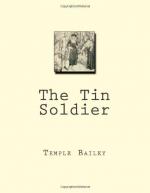“If you should come to us, to me and my father, you would be a queen on a throne. If you could love me just a little in return—”
She could not answer, she just stood looking up at him, and suddenly his arms went around her. “Tell me, beloved.”
* * * * * *
An hour later they went in to his father, and after that Emily was lifted up on the wings of an enthusiasm which left her breathless, but beatified. “I knew when I first saw you what we desired,” said the old man, “and my son knew. All that I have is yours both now and afterwards—”
Dinner was a candle-lighted feast, with heart-shaped ices at the end.
“How sure you were,” Emily told her lover, smiling.
“I was not sure. But I set the stage for success. It was only thus that I kept up my courage. There were so many chances that the curtain might drop on darkness—,” his hand went over hers. “If it had been that way, I should have let the ices melt and the violets die—.”
After dinner they went over the house. “Why should we wait,” Ulrich had said, “you and I? There is nothing to wait for. Tell me what you want changed in this old house, and then come to it, and to my heart.”
It was, she found, such a funny old place. It had been furnished by men, and by German men at that. There was heaviness and stuffiness, and all the bric-a-brac was fat and puffy, and all the pictures were highly-colored, with the women in them blonde and buxom, and the men blond and bold—.
But Ulrich’s room was not stuffy or heavy. The windows were wide open, and the walls were white, and the cover on the canopy bed was white, and there were two pictures, one of Lincoln and one of Washington, and that was all.
“And when I have your picture, it will be perfect,” he told her. “Where I can see you when I wake, and pray to you before I go to sleep.”
“But why,” she probed daringly, “do you want my picture?”
“Because you are so—beautiful—”
It was not to be wondered that such worship went to Miss Emily’s head. She slipped out of the dried sheath of the years which had saddened and aged her, and emerged lovely as a flower over which the winter has passed and which blooms again.
“I don’t want to change anything,” Emily told her lover as they went downstairs, “at least not very much. I shall keep all of the lovely old carved things—with the fat cupids.”
As she lay awake that night, reviewing it all, she thought suddenly of Bruce McKenzie’s letter in her apron pocket. The apron was in the Toy Shop, and it was not therefore until the next morning that she read the letter.
In it Dr. McKenzie asked her to marry him.
“I should like to think that when I come back, you will be waiting for me, Emily. I am a very lonely man. I want someone who will sympathize and understand. I want someone who will love Jean, and who will hold me to the best that is in me, and you can do that, Emily; you have always done it.”




